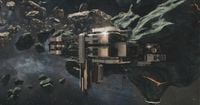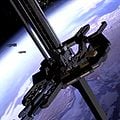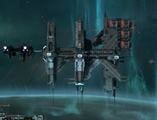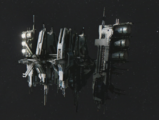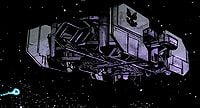Space station: Difference between revisions
From Halopedia, the Halo wiki
| Line 29: | Line 29: | ||
**''[[Malta Station]]'' | **''[[Malta Station]]'' | ||
**''[[Nassau Station]]'' | **''[[Nassau Station]]'' | ||
**''[[Oaxaca Station]]'' | |||
*'''[[Refit station]]''' - a mobile UNSC ship repair dock. | *'''[[Refit station]]''' - a mobile UNSC ship repair dock. | ||
**''[[Anchor 4]]'' | **''[[Anchor 4]]'' | ||
Revision as of 03:45, December 12, 2014
| There is more information available on this subject at Space station on the English Wikipedia. |
A space station is a platform or facility built for use such as habitation, research or defense in a planetary orbit or deep space. The term can also be applied to mobile facilities.
Overview
The first human space station in the modern era was the Russian Salyut 1, launched on April 19, 1971. Following the success of the Salyut-series in the 1980s, the Russians launched the Mir on 20 February 1986. The Mir was the first modular space station capable of supporting multiple unit modules, thus allowing greater flexibility in operation, as well as removing the need for a single immensely powerful launch vehicle.
In 1998, five space agencies came together and initiated the International Space Station programme, a global effort to construct a space station for research purposes in a microgravity and space environment as well as serving as a landing platform for the testing of spacecraft systems and equipment required for missions to the Moon and Mars.
More space stations were constructed across Sol with the advent of interplanetary colonization in the late 21st century, followed by other star systems in humanity's subsequent interstellar era. By the 26th century, space stations had come to fill a broad range of roles as starship construction and docking facilities, heavily-armed defensive outposts, fleet support, even as colony habitats, in addition to their original primary role as science facilities.
List of known human space stations
- Carinae Station
- Casimir Station - a space station presumably in orbit over Reach.
- Chiron - a UNSC platform over Mars, housing a prominent extreme-conditions training facility.
- Eridanus Secundus - a hollowed-out asteroid converted into an Insurrectionist habitat.
- Far-gone colony platforms - a series of human space habitats.
- Gamma Station - a space dock in orbit around Reach.
- Io Station - a listening post near Io in the Sol system.
- Ivanoff Station - a UNSC orbital research facility based in an asteroid field near Installation 03.
- Lawrence Space Station - a human space station in the 26 Draconis system.
- Lisbon Station - a UNSC research facility established near Installation 05.
- Lockhart medical station - a UNSC medical facility.
- Midpoint Anchorage - a space dock located in the Sol system.
- ONI orbital facility - an ONI station in orbit over Earth.
- Orbital defense platform - a type of UNSC planetary defense station.
- Refit station - a mobile UNSC ship repair dock.
- Anchor 4
- Anchor 9 - one of 18 refit stations in Reach's orbit.
- Anchor 10 - a refit station near Dryad.
- Cradle - a refit station destroyed in the Battle of Sigma Octanus IV.
- UNSC Hopeful - a mobile state-of-the-art medical station constructed from two refit stations.
- Remote scanning outpost - UNSC space stations designed to monitor in- and outbound slipspace traffic.
- Archimedes - the Sigma Octanus system's remote scanning outpost.
- Fermion - an RSO based in the Epsilon Eridani system.
- Democritus - a remote sensing station in the Sol system.
- Reyes-McLees Shipyards - a major UNSC ship construction facility over Mars.
- Station Jefferson - an Insurrectionist facility in the Eridanus asteroid belt.
- Station Wayward Rest - the terminal station of the Centennial Orbital Elevator.
- Tiara - a space elevator anchor and terminal facility in orbit around Harvest.
- The Rubble - an elaborate, independently-governed habitat in the 23 Librae system constructed from a network of connected asteroids.
- Tripoli - a UNSC deep-space station.
- Unidentified ONI medical facility - an ONI medical station in Reach's orbit.
- UNSC construction platform - modular starship construction and repair facilities utilized by the UNSC.
Space stations in the Covenant
The Covenant was a chiefly space-based civilization; the hegemony's military was heavily distributed across vast space fleets, and its capital city High Charity was a mobile station almost constantly on the move. This stands in contrast to humanity's practice of concentrating their cultural, political and military centers on planets.
List of known Covenant space stations
- High Charity - the Covenant's mobile capitol and holy city.
- Unyielding Hierophant - a Covenant mobile fleet command center.
- Station of Constant Sustenance - a resupply facility in the fringes of the Covenant's empire.
- Ap'ot Port - a Kig-Yar spaceport in the Y'Deio system.
- Ranarum Orbital Platform - a Sangheili space station and docking facility orbiting their homeworld Sanghelios. It houses the Aanrar Shipyard.
- Oth Lodon station - a station operated by the New Colonial Alliance and Covenant remnants.
Forerunner space stations
The Forerunners constructed their most notable space installations on a planetary scale, and many of them are more aptly described as megastructures than space stations. The Halo rings, the Arks, the shield worlds and the Capital are examples of such installations. Nonetheless, there are some which fall within the more conventional definition of a space station.
- Deep-Space Anomaly 0198 - a small station in orbit around Threshold in the Soell system.
Gallery
Ivanoff Station, an asteroid-based research facility near Installation 03.
UNSC Hopeful, a mobile hospital platform constructed from two repurposed refit stations.
Io Station, an outpost in the Sol System.
The Covenant mobile station High Charity.
A Covenant station near Oth Lodon.
A holographic representation of the Covenant mobile space station Unyielding Hierophant.
This is a disambiguation page — a navigational aid which lists other pages that might otherwise share the same or a similar title. If an article link referred you here, you might want to go back and fix it to point directly to the intended page.
